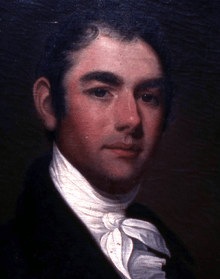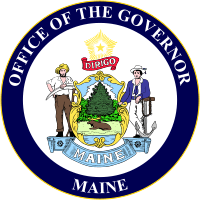William King (governor)
William King (February 9, 1768 – June 17, 1852) was an American merchant, shipbuilder, army officer, and statesman from Bath, Maine. A proponent of statehood for Maine, he became its first governor when it separated from Massachusetts in 1820.
William King | |
|---|---|
 King circa 1806 | |
| 1st Governor of Maine | |
| In office March 15, 1820 – May 28, 1821 | |
| Succeeded by | William D. Williamson |
| Member of the Massachusetts Senate | |
| In office 1807–1811 1816–1820 | |
| Member of the Massachusetts House of Representatives | |
| In office 1795–1799 | |
| Personal details | |
| Born | February 9, 1768 Scarborough, Province of Massachusetts Bay, British America |
| Died | June 17, 1852 (aged 84) Bath, Maine, U.S. |
| Political party | Democratic-Republican Party |
Personal and business career
William King was born to Richard King, a merchant and shipowner, and Mary Black, on February 9, 1768, at Scarborough, then in the Province of Massachusetts Bay. His formal education was limited to local schools (he spent one term at Phillips Academy) and ended when he was thirteen. He was largely self-educated. Starting as a hand in a saw-mill, he went on to open his own mill.
King was employed in a variety of businesses, including as a shipbuilder, then a ship-owner. He became the largest merchant shipping owner in Maine. He became a successful merchant and a significant real-estate investor. He opened the first cotton mill in Maine, at Brunswick. He founded and was president of the first bank of Bath.
In 1812, what is now known as the Stone House, King's summer retreat, was built on in rural Bath.[1]
King was a Scottish Rite Freemason and later -while he was the Governor of the State- he became the first (Past) Grand Master of Maine[2][3], elected in June, 1820 by the representatives of twenty-four Lodges which "met, adopted a Constitution, and elected officers".[4]
Political career
King became active politically in 1795 as a member of the Democratic-Republican Party. He represented Topsham in the Massachusetts House of Representatives in 1795 and 1799. After he moved to Bath, he represented that town in 1804. He served in the Massachusetts Senate for Lincoln County from 1807 to 1811.
When the War of 1812 began, Massachusetts made him major general of the militia, in charge of the Maine district. He devoted much of his attention to coastal shipping and defenses. He also led recruiting efforts for the regular army, for which he was made a colonel in the United States Army. In 1813 King began a seven-year effort that started with his petition to Massachusetts for separation.
In 1816 he was re-elected to the Massachusetts Senate, and finally secured their approval for Maine to become a separate state, in 1818. The Missouri Compromise allowed Maine to be recognized as a state on March 15, 1820. He was shortly thereafter elected governor of the new state.[5]
In May 1821, President James Monroe named him as a special minister to negotiate a treaty with Spain. King resigned as governor on May 28, 1821, to take the position of U.S. commissioner.
By 1824 he had successfully negotiated a treaty that kept the United States from becoming embroiled in issues surrounding the Mexican struggle for independence. He returned home and resumed private life.
With the shifting of political parties, he ran once more for governor, as a Whig in 1834, but lost.
Later life
King continued as a prominent business man, investor, and ship-owner. Even though he had a very limited education, he served for years as a trustee and overseer of Bowdoin College, and as a trustee of Waterville College (now called Colby College).[6]
He died at home, in Bath, Maine, on June 17, 1852, and is buried in the city's Maple Grove Cemetery.[7]
See also
Further reading
- Smith, Joshua M. ""The Yankee Soldier's Might: The District of Maine and the Reputation of the Massachusetts Militia, 1800-1812," New England Quarterly LXXXIV no. 2 (June 2011), 234-264.
- Marion Smith; "General William King: Merchant, Shipbuilder, and Maine's first Governor"; 1980, Down East Books, ISBN 0-89272-072-7.
References
- "NRHP nomination for Gov. William King House". National Park Service. Retrieved April 26, 2016.
- "Celebrating more than 100 years of the Freemasonry: famous Freemasons in the history". Mathawan Lodge No 192 F.A. & A.M., New Jersey. Archived from the original on May 10, 2008.
-
- "Famous Master Masons". mastermason.com. Archived from the original on September 30, 2018. Retrieved September 30, 2018.
- "The Masonic History of the Northwest". phoenixmasonry.org. The History Publishing Company. pp. 185–186. Archived from the original on December 17, 2017.
- "Maine Governor William King". National Governors Association. Retrieved August 18, 2012.
- "William King". Architect of the Capitol. Retrieved August 18, 2012.
- History of Bath and Environs, Sagadahoc County, Maine: 1607-1894, Parker McCobb Reed (1894)
External links
| Party political offices | ||
|---|---|---|
| Preceded by Peleg Sprague |
Whig nominee for Governor of Maine 1835 |
Succeeded by William Kent |
| Political offices | ||
| Preceded by None |
Governor of Maine 1820–1821 |
Succeeded by William D. Williamson |
